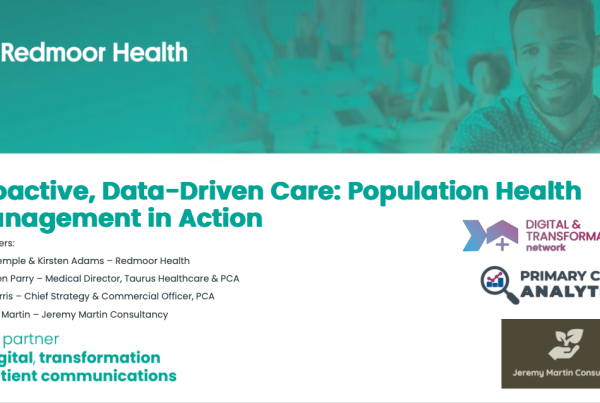 General Practice data is the only national dataset which allows true insight to the whole of the country’s health, rather than only those in immediate need. However, its value is underestimated, and its insight is not routinely leveraged by national policy, and local decision makers.
General Practice data is the only national dataset which allows true insight to the whole of the country’s health, rather than only those in immediate need. However, its value is underestimated, and its insight is not routinely leveraged by national policy, and local decision makers.
The use of this data in a lot of localities can be simplistic, and lacks the dedicated time, focus and analytical capability to maximise what is the richest dataset across Health and Social Care. Inevitably, much of the current focus is on hospitals, their waiting lists and either supporting discharge, and in some instances seeking to prevent admissions. Whilst this is understandable with the immediate pressures faced in Emergency Departments across the country, the focus on the “back-end” of the system does little to truly embed Population Health Management, to properly improve health outcomes for the population.
In our home county of Herefordshire, we have seen a reduction in the average life expectancy and average healthy life expectancy of both males and females, with the knowledge that those living in the most deprived areas in the county can expect to live up to 5.2 years less than those in more affluent areas.
The key factor to improving health outcomes in the country is truly embedding Population Health Management, identifying those at risk and intervening earlier – General Practice data holds the secret to this.
The following report highlights some key areas where immediate attention could result in quick gains, as well as some longer-term areas of focus, to better embed primary care information as part of true Population Health Management.
Use of data – Growing Primary Care data at system level
A fundamental shift is required in understanding and utilising primary care data at all levels within the Health and Care system.
We see General Practice capability and capacity missing in ICBs across the country, with strong analytical teams in terms of skills and capacity, coming from all health and care backgrounds, except General Practice. This is also familiar in NHS England teams. This is not necessarily by choice but driven by availability.
Without this capacity and knowledge in ICB’s and at system level, this often leaves systems shortsighted on the right data and insight, allowing them to continue focus on the back end of the hospital. This misses the opportunity to improve health outcomes for the whole population and slowly turn the tide of investment in prevention.
General Practice needs to lead this conversation and improvement for itself, working through existing structures such as Primary Care Networks (PCNs), or even groups of PCNs from the bottom up, and not to rely on limited information, outputs, and analysis from national, regional, or ICB teams. It is most effective when Primary Care Networks are using the data they own, in way that is meaningful and recognised but to empower this further we need to provide the skills, resources and tools for PCNs to truly thrive and make the most out of their data. There needs to be encouragement, support, and resource to build local teams, led by General Practice or experts in the field.
Further exacerbating the situation are national outputs and disparate teams across NHS England, with limited visible communication between them. There is confusion over what data there is, where it is held, where data has originated, what data is used and seeking answers to these questions is impossible. Simply bringing all health data together into a single source could rapidly change the analysis available nationally, as it becomes clearer what data is available.
Reviewing the data infrastructure for improved analysis
To effectively harness the power of data, there are two main areas of focus to improve the infrastructure: firstly, a thorough review of General Practice data and system capabilities, and a review of the analytical capacity and capability nationally.
A review of all GP EPR systems will highlight the need for standardised approaches to data capture within core systems. We need to ensure there is a minimum requirement for operating systems to make it easy for data to be pulled directly from systems without resource intensive interventions. QoF and incentive driven coding is effective to an extent, but this can be tackled further with dedicated time and system vendor investment to ensure coding is standardised, documented, and shared, which would be more cost effective than incentivising every code. This will require some clinical and clerical time to develop and implement.
This will result in technical upgrades to core IT systems, forcing providers to minimise the variability across the sector to reduce the challenges with data quality and consistency across the sector currently rendering some comparisons meaningless.
As alluded to above, a review of analytical capacity nationally will highlight the lack of current understanding of primary care data within integrated care systems, particularly in analytical roles.
This journey has started in a lot of areas, but it is being led by others. Chief Information Officers have become a staple role in most health and care organisations except, it would seem, in General Practice. When looking across the country and through National forums, it appears Taurus Healthcare is one of, if not the only General Practice provider organisation that has a Chief Information Officer working directly for Primary Care Networks. It is the stark reality of the landscape across General Practice, that a Health economy with c.6500 GP Practices, c.1250 Primary Care Networks and c.200 GP Federations, that there may be only one person formally in such an important role for data and analytics.
By promoting the importance of General Practice data at a national level, it will drive local systems to invest more time and focus, and in time, their resources in building up their analytical capabilities to match those currently invested in acute systems.
Recognising the value of wider primary care data
Whilst the primary focus of these observations is on data from General Practice, other elements of the sector are rarely considered due the inability to provide any reliable, scalable data. With no true visibility of pharmacy, optometry or dentistry data at a PCN/ICS level, there is little understanding as to the demand on these services, or the potential failure demand that potentially poorly managed services place on the wider health system. Similarly, there is no ability to evidence just how much these services are truly used as alternatives to General Practice.
There needs to be a strong voice to work with wider Primary Care, IT system providers and sector experts, to improve data standards across pharmacy, optometry, community, and dentistry allowing analysis at scale, to highlight true demand, cost avoidance/saving and identifying further opportunities to improve patient care and pathways.
As described in the Fuller Stocktake Report, we need to be harnessing the collective insight of Integrated Neighbourhood Teams, bringing Primary Care together and improving integrated urgent care as a system. As stated, the importance of improvement support, data and leadership is central to making this work. There is a long way to go to ensure the building blocks are in place to achieve this.
Reimagining General Practice
Moving to a new way of working in General Practice is necessary, emphasizing the obligation to operate at scale and reduce unwarranted variation. This will be explained further through the work the NHS Confederation’s Primary Care Network is doing to reimagine the future of primary care, whom we at Primary Care Analytics/Taurus Healthcare work closely with. It is particularly relevant here also, for a modern-day general practice to become fit for purpose, it needs staffing, financial and technological infrastructure to match that of an NHS Trust, the capability to evidence what is happening now and enabling a data driven view of what is anticipated and achievable going forward. Using actionable insight to start to identify key cohorts of patients, such as intensive (and inherently costly) patients and understanding efficient and effective models of care.
As an example, cardiovascular disease is recognised as an understandable cost pressure. This suggests targeting resources and capabilities efficiently to address this issue, emphasizing the need for a strategic reallocation of funds based on data insights. Focussing on identification and risk stratification to prevent these diseases in the first place or at least minimise deterioration. The key though is a consistent and intelligent way of using data and insights which is not well resourced within General Practice.
NHS Confederation’s work to look at the opportunities of scale, not only to support the sustainability of general practice but to provide an infrastructure for left-shift. This model, rooted in powerful data analytics, showcases the potential for transforming General Practice. It also recognises that harnessing the data coming from 90% of NHS contacts, is going to be essential to support the innovation needed to move care into community settings.
As recommended in the NHS Confederation’s report last year ( Supporting general practice at scale: fit for 2024/25 and beyond | NHS Confederation) “There are varying levels of digital maturity across primary care. Short-term funding arrangements hamper the ability to integrate, collaborate and innovate and General Practice Access Data (GPAD) does not truly reflect demand, pressure, and activity across the board. Now, more than ever, a sustainable primary care system requires robust data and digital capabilities to deliver care effectively, tailor services to the needs of patients and inform future service redesign.”
Additionally, it should also acknowledge and advocate for the recognition of internal models that reinvest back into General Practice, deviating from the traditional reliance on external private providers.
Data sharing
Of course, primary care data does not sit in isolation. There are examples across the country of programmes where data has been joined up offering greater insight, such as Kent and Medway ICS’s shared care record which sees the use of integrated Health and Care data sets. However, often, systems struggle to do this either for fear of getting their data sharing wrong, or having limited capacity delayed by over-zealous IG professionals. Birmingham and Solihull ICS also have a strong data sharing model seeing General Practice data linked up with Acute, Community and local authority data. Similarly, Greater Manchester Connect work recognised the importance of the time and effort invested in focussing on IG at early stages before being able to progress to the outputs. Unfortunately, these examples are the exception to the rule, and this success isn’t shared widely across ICSs. Some of this could be expedited by supporting with legal fees, workforce, and national resources, solving an issue once at national level, rather than asking 42 care systems.
The 4 key recommendations from this paper:
- Endorse a bottom-up strategy, to outline ambitions, deliverables, and requirements to drastically improve how Primary Care data is used and actioned in ICB localities.
- Commission a national review of General Practice analytical capability, capacity, and requirements and use this to formulate a strategy to increase analytical capacity.
- Create a national working group of analysts and GPs to create and, use data definitions as a basis for starting a review of GP EPR systems, to increase and improve data accuracy and consistency across the country.
- Mandate a national committee led by General Practice subject matter experts to provide governance, support, and oversight to ensure that data supports practices, honouring the trust instilled when sharing data more widely and ultimately works to the public good.
In conclusion, this paper calls for a comprehensive and transformative approach to primary care data, urging the government to leverage its leadership for strategic gains. There is recognition that funding is not readily available and therefore more needs to be done to mandate, empower and support General Practice to maximise what is already available in a more intelligent way. The proposed opportunities aim to address several key issues, emphasize the immense potential of owning and utilizing primary care data with the aim of improvement of the healthcare system ultimately having a positive impact on the health of the whole UK population.
Authors:
Conor Price
Managing Director for Primary Care Analytics & Chief Information Officer Taurus Healthcare
NHS Confederation’s Primary Care National Co-Chair of the Data & Digital Design Group
NHS Confederation’s Primary Care National Chair of the Digital Transformation Lead Forum
Paul Harris
Chief Strategy Officer for Primary Care Analytics & Head of Data Strategy for Taurus Healthcare



